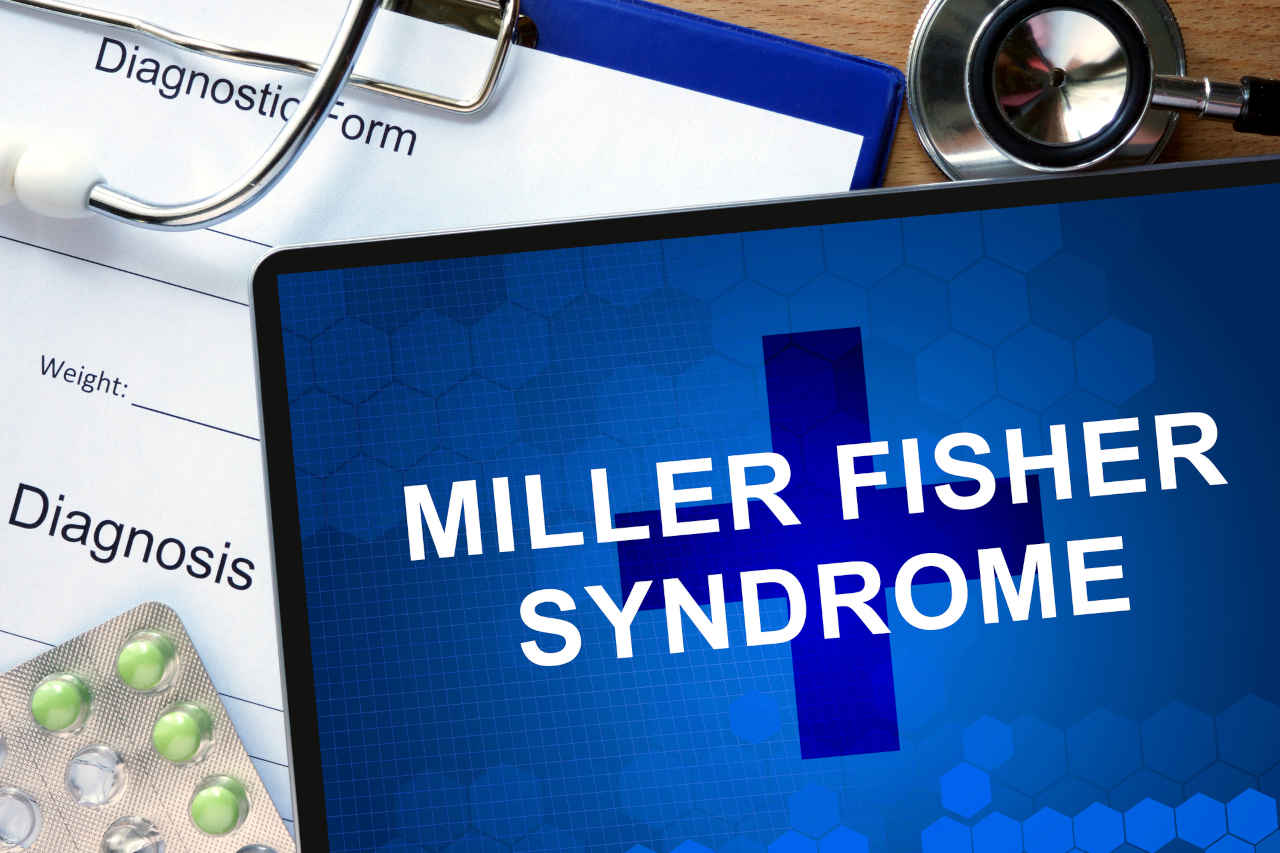
Miller Fisher syndrome (MFS) is a rare autoimmune nerve disorder that typically results in disruptions to coordination, balance, and functions of the upper body, including eye and facial movement. It has an estimated prevalence of approximately 1 in 100,000 individuals.
Speak to a Specialist
About Copay AssistanceThis disorder represents a variant or subtype of Guillain-Barré syndrome (GBS), which is another autoimmune nerve disorder but more prevalent. GBS typically leads to the loss of reflexes and muscle weakness in the lower body. Both Miller Fisher syndrome and Guillain-Barré syndrome are triggered by preceding viral or bacterial infections.
This article will delve into the topic of Miller Fisher syndrome, covering its symptoms, causes, treatment options, and preventive measures.
What Is Miller Fisher Syndrome?
Miller Fisher syndrome is an autoimmune disorder in which the immune system mistakenly attacks the healthy nerves while fighting or killing a previous or already-existing infection.
Although it is a rare condition, it can manifest in individuals of all ages, including both children and adults.
As Miller Fisher syndrome typically attacks the nerves of the upper body, people may face difficulty with their vision, balance, and coordination, as well as difficulty moving facial muscles, arms, and legs. Importantly, Miller Fisher syndrome is not transmissible, meaning it cannot be transmitted from one person to another.
Symptoms of Miller Fisher Syndrome
Symptoms might differ from person to person. Some people get symptoms 10 – 20 days after contracting a viral or bacterial infection, while others may not experience any symptoms for several weeks. It generally comes unexpectedly and persists for a few days.
The common symptoms of Miller Fisher syndrome include:
- Blurred vision
- Double vision
- Drooping eyelids
- Difficulty in moving facial muscles (facial paralysis)
- Difficulty in eye movements
- Muscle weakness, especially of the face, tongue, eyes, arms, and legs
- Abnormal or lack of muscle coordination
- Swallowing difficulty
- Loss of reflexes in the tendons
- Breathing difficulty
What Is the Cause of Miller Fisher Syndrome?
Miller Fisher syndrome often arises as a result of a preceding viral or bacterial infection, as it occurs when the immune system erroneously targets the nerves while combating or clearing the infection.

The following types of viral or bacterial infections are seen to trigger Miller Fisher syndrome:
- Epstein-Barr virus, a contagious viral infection that spreads through bodily fluids, for example, saliva
- Campylobacter infection, an infection that occurs from consuming contaminated or untreated water, undercooked or raw foods, or unpasteurized dairy foods
- Zika virus, a viral infection that occurs through specific types of mosquitoes
- HIV virus (Human immunodeficiency virus), a viral infection that affects and weakens the immune system
- Haemophilus influenzae, a bacterial infection that can affect and invade different parts of the body
Diagnosis of Miller Fisher Syndrome
There is no specific test that directly diagnoses Miller Fisher syndrome or confirms its presence. Initial diagnosis is done on the basis of your symptoms, your medical history, and whether you had a previous viral or bacterial infection in the past 1 – 4 months.
If your doctor suspects Miller Fisher syndrome based on their evaluation of your symptoms and medical history, they may proceed with the following tests:
Can IVIG help?
Free IVIG Treatment InfoBlood Tests
Blood tests are performed to detect the levels of antibodies in your blood. A high level of antibodies may indicate that your body has encountered an infection. The presence of antibodies can help confirm Miller Fisher syndrome.
Antibodies aid in the battle against diseases and are created by the immune system when it comes into contact with foreign things such as bacteria, viruses, fungi, or other infectious substances.
Nerve Conduction Test
The nerve conduction test is used to determine how fast an electrical signal passes through a person’s nerves. If there is any nerve injury, it can affect how long it takes electrical impulses to travel through the nerves.
Electromyography
Electromyography is another test that evaluates how muscles respond as they receive signals from nerves. In Miller Fisher syndrome, both nerves and muscles are affected, so tests including electromyography and nerve conduction tests help assess their functioning.
Lumbar Puncture
Similar to blood tests, a lumbar puncture, also known as a spinal tap, is performed to assess specific antibodies. During a lumbar puncture, antibodies from the spinal fluid are examined by obtaining a sample of fluid from the spine.
Treatment of Miller Fisher Syndrome
The treatment of Miller Fisher syndrome is focused on preventing the immune system from attacking healthy nerves. The following therapies are commonly done:
Plasmapheresis
Plasmapheresis, also known as plasma exchange, is a medical procedure designed to isolate harmful antibodies from the blood.
Intravenous Immunoglobulin (IVIG) Therapy
Intravenous immunoglobulin therapy parenterally administers healthy antibodies obtained from multiple donors. The administration of healthy antibodies boosts the functioning and recognition ability of the immune system, preventing it from attacking healthy tissues and nerves.
Physical Therapy
Physical therapy, also known as physiotherapy, aims to assist the patient in recovering muscle movement, enhancing strength, coordination, balance, and flexibility. A physical or occupational therapist may suggest specific exercises or techniques for you to incorporate into your routine regularly, fostering muscle strength improvement and the restoration of balance.
What Is the Recovery Duration of Miller Fisher Syndrome?
Miller Fisher syndrome symptoms typically appear quickly and progress for many weeks before improving. On average, it may take up to 4 weeks to 6 months for full recovery, which can vary depending on individual patient factors. Other symptoms may improve within 4 weeks, but the recovery of muscle weakness may take additional time.
Nonetheless, adequate medical oversight and hospitalization are essential during the illness and treatment process, as they depend on the patient’s condition. This is crucial because Miller Fisher syndrome can lead to potentially fatal cardiac and respiratory issues if not promptly addressed.
Get IVIG Copay Assistance
IVIG Financial AssistancePrevention
Miller Fisher syndrome is difficult to prevent, but you can successfully treat its underlying cause by implementing infection-prevention measures. The key to infection prevention is perfect cleanliness, as demonstrated by doing the following:
- Avoid interacting with or consuming contaminated or untreated water.
- Maintain distance from people who are sick or suffering from infections.
- Use and keep a sanitizer with yourself when outdoors, and wash hands often, especially before eating, after using the toilet, and coming from outside. Additionally, wash your hands with soap after touching any contaminated or outdoor surfaces for 2 minutes.
- Steer clear of touching your face, particularly when your hands haven’t been properly cleansed.
- Cover your mouth while coughing or sneezing.












